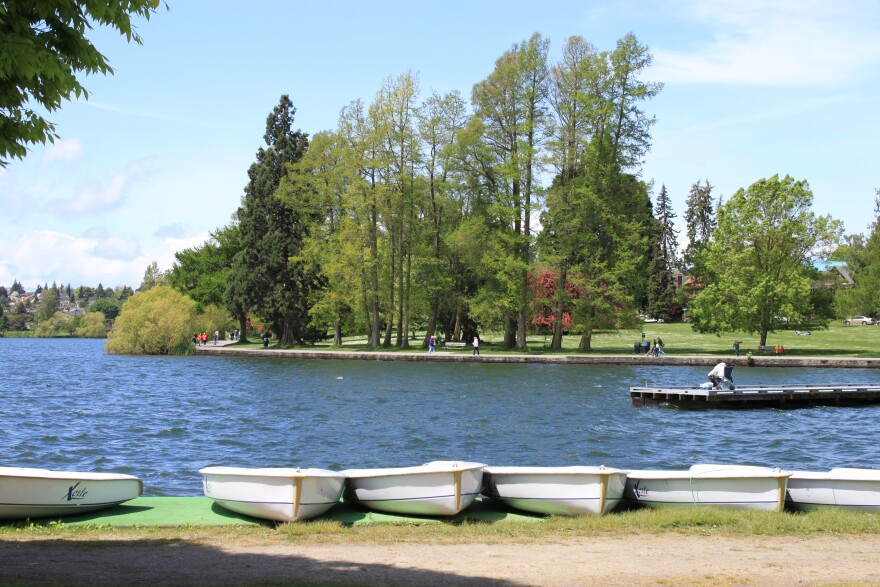Voters in Seattle will decide whether to establish a special taxing district to help fund the city’s parks.
Proposition 1, which appears on the Aug. 5 ballot, has created a rift in the ranks of park advocates.The proposal is to set up what’s called a Metropolitan Park District within the Seattle city limits.
The park district would tax homeowners 33 cents per $1,000 of assessed home value. For the owner of a $400,00 house, it would amount to $148 a year — around $4 a month more than the current parks levy assessment.
History Of Park Districts Goes Way Back
Wright Park is one of the oldest parks in Tacoma, complete with a turn-of-the-20th century conservatory and an oak tree planted in honor of President Teddy Roosevelt's visit.

Parks historian Melissa McGinnis says the land was donated to the city in 1886 by the Tacoma Land Company. At the time, Tacoma was booming and the air was pretty dirty.
"It’s lots of wood stoves, a lot of coal stoves. There's trains coming in and out. We've got railroad and lumber mills. These parks were called the lungs of the city," McGinnis said.
There was a problem, though. City leaders didn't have the money to develop, plant and maintain the parks.
So Tacoma leaders went to Olympia and convinced the Legislature to allow cities to create special park districts, complete with taxing authority.
Tacoma’s Metropolitan Park District, with a board elected to six-year terms, has been in place since 1907.
After A Century, Seattle Might Follow Tacoma's Lead
Former Seattle Parks Superintendent Ken Bounds sounds remarkably like those civic leaders of old when he talks about the benefits of creating a Metropolitan Park District in Seattle.
“It’s good for our quality of life and good for our health if voters approve this and we have a long-term, sustainable, dedicated fund source for parks and recreation,” Bounds said.
Sitting on a bench at Alki beach in one of Seattle's parks, Bounds points out that during the recession, community center hours were cut and maintenance at parks suffered. He and other proponents of creating a park district cite a $267 million backlog in maintenance projects.
Better Than Levies?
Bounds says going to voters every six years with a levy proposal, as has been the practice in Seattle, isn’t the best solution, because the focus is almost always just on new projects rather than meeting basic needs.
“And, in fact, in the 2008 levy, there were 14 sites that got acquired but didn’t get developed because there wasn’t enough money to develop them,” Bounds said.
Bounds says two-thirds of the money collected by the new park district would go towards developing those parks and to long-term maintenance.
In addition to money raised through the new taxing authority, the city insists it would continue to pick up part of the tab for parks out of the general fund.
How Seattle Park District Would Differ From Tacoma
In a shift from the Tacoma model, Seattle would not have a separate park district board. Members of the Seattle City Council would act as ex-officio members of the park district board.
That's one complaint opponents have about the proposal. They say an elected board just to deal with parks would be more responsive than a city council that has many other duties.
Some Neighborhood Activists Say Proposal Is Undemocratic
The major opponents to creating a Metropolitan Park District in Seattle might surprise you.
Many, including Don Harper who sits on the Queen Anne Community Council, are long-time park advocates.
“We’re very pro-parks and we’re for additional funding for parks,” Harper said.
In fact, I interviewed Harper near a Queen Anne park and playground that he had helped raise money for.
There Are Fans Of Levies
Harper says his big concern about a park district is that once its created, you don’t vote on park projects anymore.
“We just believe that a levy is the most democratic approach," Harper said.
With the levy, Harper says, citizens have a more direct say in which projects get funded. For Harper, turning power over to the city council is more elitist than giving voters the say.
"You know, the mayor and the city council, they know better, kids. You sit back and we’re going to take care of you,” Harper said.
Proponents Say Citizen Oversight Doesn't Go Away
Proponents of creating a Metropolitan Park District say there would still be a citizen oversight committee to give input on park spending.
And, they say, you could still have a say.
Proponents say if you don't like what city council members do as members of the Metropolitan Park District, you can always vote them out of office.







